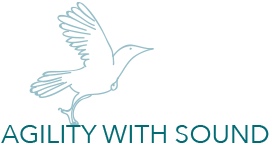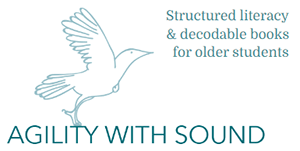The texts challenge my struggling older readers to use taught word recognition and decoding strategies authentically. Many of the books have a New Zealand culture and history focus and all texts provide lots of opportunities for language comprehension and critical thinking. The texts support students’ word study and phoneme-to-grapheme mapping at the lower level and advanced phonemic awareness and spelling pattern recognition at the higher level. Because the texts link to the Wordchain app, reading and spelling skill development becomes part of a structured literacy programme that is manageable for the teacher in the classroom setting.
For the last two years we have been learning about and supporting schools to implement Betsy Sewell’s Agility with Sound Programme. Betsy has provided the knowledge, skills and support to make the implementation of this Structured Literacy programme a great success in our Manurewa Community. Agility with Sound has been a brilliant resource for our schools and has provided a way of supporting our older struggling readers. Betsy also supports us by modelling lessons, which we find extremely helpful, and we now have many schools using the programme. The Wordchain app and web tool also boost student learning and we have had many students within our cluster experience accelerated progress in Literacy.
The Learning Support Assistants have been working one to one with our tier 3 students (11) and in small groups with our tier two students and all students work with a Learning Support Assistant 4 times per week. A structured lesson plan, using resources from Agility with Sound, is followed using a variety of learning tasks that help support letter/sound learning; chunking, word building, word chains, word puzzles, dictation, sliding cards, reading fluency and text comprehension. Text comprehension starts only after decoding words is fluent and automatic. This may take some time for tier 3 students, who are well below the expected level and may also have a learning disability such as dyslexia, issues with processing, or other undiagnosed learning difficulties.
The Agility with Sound Initiative began in term 1 week 5. All staff in the unit had professional development using formative assessment developed by Betsy Sewell. We then planned a 30 minute session (10 minutes on Wordchain app, then 15 to 20 minutes with an LSA) per student or students depending on the need. This helped the LSA’s to be confident when supporting students.The Learning Support Assistants watched all videos and practised with each other using the letter/sound tiles, word sliders, dictation, word cards, word chains, decodable texts, discussions about texts and the Wordchain app.
Our observations
- Students and Learning Support Assistants moved very quickly to use sounds rather than letter identification.
- Students enjoyed the structured lesson with a variety of skills being taught.
- Students enjoyed the challenge of the word cards and could keep track of their own progress.
- Students were able to decode and read the texts. This was really exciting as most students had struggled with reading for 6 years (we are an intermediate school).
- Reading comprehension improved.
- Students wanted dictation to be part of every session. They could spell words and because we included punctuation as well, achievement happened and students felt good about their learning.
- For some of our boys, competition with correct spelling using the word tiles was a favourite game.
- Students could work together using word tiles and word sliders. This helped with independence and supporting each other.
What an amazing programme written by a passionate and knowledgeable woman who has worked out how we can help all learners to achieve success in literacy.
We have been using Agility with Sound for two and a half years, and the success and achievement in our learners has been beyond our belief. We have students who did not read at all in the beginning, now leaving Year 8 achieving alongside their peers.
Nothing makes me happier than the smiles of achievement on my students’ faces.
We trialled AWS with some of our target students last year. The results we achieved were fantastic, but what was even more exciting was that our students enjoyed the programme, remembered to go each day and that other students wanted to join as well. It is exciting when you have intermediate aged students asking to be part of a reading intervention.

